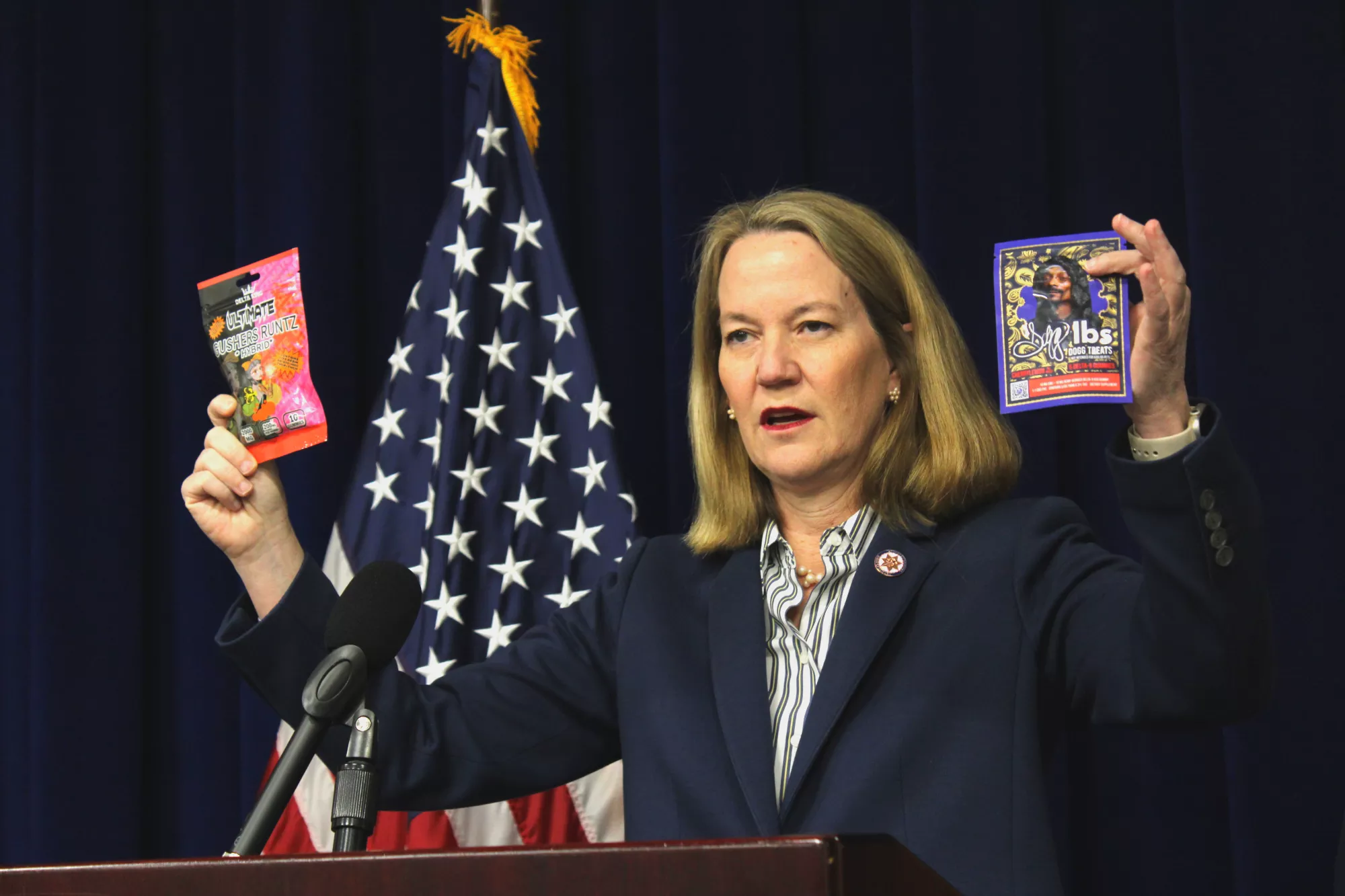[[{“value”:”Next week, a Maricopa County Superior Court judge will decide whether gas stations can again sell THC-infused drinks and gummies. At least for the moment.
In March, Arizona Attorney General Kris Mayes announced a crackdown on hemp-based THC products sold outside of dispensaries, arguing that they are illegal under state law. Mayes’ enforcement action, which threatened fines of up to $20,000 per sale, was challenged in court by the Hemp Industry Trade Association, which asked Judge Randall Warner to issue a preliminary injunction against banning the products while the case plays out.
Friday, at the end of a long hearing that featured hours of expert testimony, Warner said he will rule next week. If he grants the preliminary injunction, Arizonans will again be able to purchase hemp-based THC products that have proliferated in gas stations and smoke shops in recent years.
“This case is about more than regulatory overreach — it’s about defending the livelihood of Arizona farmers, retailers, manufacturers, veterans, patients and everyday adults who rely on hemp-derived products for wellness, relief and economic opportunity,” said HITA Executive Director Sully Sullivan during a June 17 press call about the case.
Hemp-based THC products, which are made with less than 0.3% hemp-derived THC, were federally legalized under the 2018 Farm Bill. After the bill passed, hemp-derived THC products, including drinks and gummies, began popping up outside of dispensaries in Arizona and beyond.
In Arizona, hemp products are regulated by the Arizona Department of Agriculture, while marijuana-based products are regulated by the Arizona Department of Health Services. Both can have intoxicating effects, though hemp-based THC products are generally less potent. But Mayes argues that hemp-based THC products are illegal if sold outside of licensed dispensaries. A year before announcing her crackdown, Mayes wrote a formal opinion to that effect, citing the Arizona Controlled Substances Act and the Arizona Safe and Smart Act, the latter of which was passed by voter referendum in 2020.
But Julie Gunnigle, a lawyer representing HITA in the suit, said that Mayes’ opinion doesn’t actually follow the law as it is written.
“The attorney general is adding words, deleting words and enforcing an interpretation that is not at all consistent with the plain language of the law,” Gunnigle said in the days leading up to the hearing. “Nowhere in the law is the word ‘intoxicating.’ Intoxicating is also a scientifically problematic word — a substance is not intoxicating. Intoxication is something someone feels upon ingesting a substance, and to that end, it is absolutely undefined.”
Two THC-infused products that Arizona Attorney General Kris Mayes said can be easily purchased outside dispensaries.
Morgan Fischer
Interestingly, the Attorney General’s Office argued during the hearing Friday that it believes the relatively harmless cannabis-derived compound CBD — cannabidiol, technically — is a narcotic and thus illegal, though criminal division chief Nicholas Klingerman added the office did not plan to enforce a ban on its sale. CBD products, which do not produce a high like their THC brethren, also abound outside of dispensaries.
No matter which way Warner rules, the decision will almost certainly be appealed to the Arizona Court of Appeals. Gunnigle said she feels confident the judges and justices on the Arizona Court of Appeals and Arizona Supreme Court — whom she called “textualists” — will side with the organization.
“What HITA has put forward is as close to a pure issue of law as one can get,” Gunnigle said. “What those judges look to are not what they think the law should be or what the law ought to be, it is what the law is on the page. If you look at what the law is on the page, HITA wins and it’s not even a contest.”
There is a potential hitch. Republicans in Congress are currently working to pass a change to the 2018 Farm Bill that would refine hemp-derived THC products and make most hemp-derived cannabinoid products federally illegal. Rep. Tom Cole, an Oklahoma Republican who chairs the House Appropriations Committee, addressed the farm bill in the new bill’s summary, writing that the change will close “the hemp loophole that has resulted in the proliferation of unregulated intoxicating hemp products, including Delta-8 and hemp flower, being sold online and in gas stations across the country.”
Gunnigle said the “loophole” characterization is inaccurate. “(The 2018 Farm Bill) intentionally created a hemp program that included all parts of the plant,” Gunnigle said. “To the degree that anyone is calling this a loophole, I would like to myth-bust that.” Sullivan agreed in a written statement to New Times, saying that “to now call these products ‘unintended’ is dishonest and deeply damaging.”
If the change to federal law is passed and signed, it would make HITA’s case against Mayes’ ban nearly impossible to win. “Were these products to ever become federally illegal, that would be devastating to the suit because our claims hinge on their federal legality,” Gunnigle said. However, both Gunnigle and Sullivan said they were confident the change wouldn’t make it through Congress.
“That has quite a few committees to go through,” Sullivan said. “And if there’s any indication from last year, we won’t see that pass.”
“}]] Arizona Attorney General Kris Mayes faces a lawsuit for declaring hemp-based THC products found in smoke shops illegal. Read More


